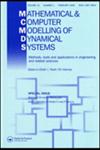超大型望远镜变形镜M4的面向控制建模与模态分析
IF 1.8
4区 数学
Q3 COMPUTER SCIENCE, INTERDISCIPLINARY APPLICATIONS
Mathematical and Computer Modelling of Dynamical Systems
Pub Date : 2021-01-02
DOI:10.1080/13873954.2020.1850480
引用次数: 3
摘要
摘要在本文中,我们推导了超大望远镜M4变形镜环形扇形板段的机械分布参数模型。此外,我们还通过分析和数值方法对导出的模型进行了模态分析。可变形反射镜M4用于抑制波前扰动并提高光学成像质量。我们提出了一个面向控制的环形扇形Kirchhoff–Love板模型,该模型具有弹性边界条件,并对六个相同的M4节段中的一个进行了模态分析。随后,我们证明了众所周知的变量分离方法与所提出的圆柱坐标下的分布参数模型的模态分析是不相容的。此外,我们使用有限差分近似成功地对模型进行了模态分析,并通过有限元近似对M4段进行了实际构造,以比较结果。模态分析提供了一致的结果,因此,分析的两个模型是一致的。本文章由计算机程序翻译,如有差异,请以英文原文为准。
Control oriented modelling and modal analysis of the deformable mirror M4 of the extremely large telescope
ABSTRACT In this article, we derive a mechanical distributed parameter model for the annular sector plate segments of the Extremely Large Telescope’s deformable mirror M4. Additionally, we modally analyse the derived model via analytical and numerical approaches. The deformable mirror M4 is used to reject wavefront disturbances and enhance the optical imaging quality. We present a control oriented annular sector Kirchhoff–Love plate model featuring an elastic boundary condition and its modal analysis for one of the six identical M4 segments. Subsequently, we show that the well-known method of separation of variables is incompatible with the modal analysis of the presented distributed parameter model in cylindrical coordinates. Moreover, we successfully modally analyse the model using a finite difference approximation and a realistic construction of an M4 segment via a finite element approximation to compare the results. The modal analyses provide consistent results and therefore, both models underlying the analyses are consistent.
求助全文
通过发布文献求助,成功后即可免费获取论文全文。
去求助
来源期刊
CiteScore
3.80
自引率
5.30%
发文量
7
审稿时长
>12 weeks
期刊介绍:
Mathematical and Computer Modelling of Dynamical Systems (MCMDS) publishes high quality international research that presents new ideas and approaches in the derivation, simplification, and validation of models and sub-models of relevance to complex (real-world) dynamical systems.
The journal brings together engineers and scientists working in different areas of application and/or theory where researchers can learn about recent developments across engineering, environmental systems, and biotechnology amongst other fields. As MCMDS covers a wide range of application areas, papers aim to be accessible to readers who are not necessarily experts in the specific area of application.
MCMDS welcomes original articles on a range of topics including:
-methods of modelling and simulation-
automation of modelling-
qualitative and modular modelling-
data-based and learning-based modelling-
uncertainties and the effects of modelling errors on system performance-
application of modelling to complex real-world systems.

 求助内容:
求助内容: 应助结果提醒方式:
应助结果提醒方式:


